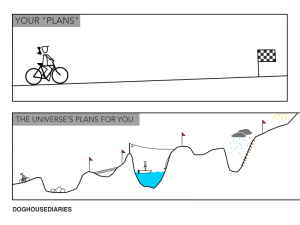| It is now very clear that a ‘linear’ approach to strategic planning (develop a definitive strategic plan and then concentrate on implementing it over the next 3-5 years until it is time to develop a new one) is too limited in an age when situations change rapidly and opportunities and threats can arise unexpectedly however thorough the organisation’s future thinking.
Strategy needs to be dynamic: organisations need to be able to adapt to changes, to navigate around obstacles and setbacks, and to be able to continually check that their desired destination and chosen route are still appropriate – hence the ‘strategy as a journey’ analogy. Inspired by Henry Mintzberg’s work I started using the term ‘strategy journeys’ in the early 2000’s to help explain to client organisations that strategic planning wasn’t a generic ‘off-the-shelf’ project approach but their own unique learning process.
There are two important implications of this approach:
- Organisations need the strategic capabilities and confidence to be able to equip themselves and embark on such a journey – and those that realise this invest in developing those capabilities – strategic thinking, strategic management, and strategic leadership – together with establishing the culture to enable and encourage strategy conversations to be part of how the organisation functions
- The ability of the organisation to learn is vital. Strategy is not just about the techniques and tools that can be used in analysis and formulation, it’s about what is learnt – collectively – from what is encountered, and then the ability to remember and act on this. (I think it was Professor Henry Mintzberg who stated that the ability of an organisation to learn was the key strategic differentiator.)
When I look back on the work I have done with organisations, it strikes me that the learning has been as important as the tangible outputs (strategic plans, initiatives implemented, models developed). Although these were the needed immediate achievements of the work, it was the learning – both individual and organisational – that was important for the longer term capabilities of the organisation.
I think that it is even more important now for organisations to adopt this approach to strategy – the changes that we have experienced over the past 18 months have shown the degree of volatility and uncertainty that can happen. I also believe that there is an important opportunity for organisations to develop and strengthen their strategic capabilities: strategy isn’t something that can be undertaken every 3 years or outsourced to external experts, it’s an integral part of how each organisation considers and determines its future. Learning how to ‘live strategy’ requires more than just knowing the tools or studying MBA-level case-studies.
As we gradually recover from the shocks of the pandemic, it will be interesting to see how many organisations invest in developing their ability to deal with whatever they might discover on the next stages of their strategy journeys. |

